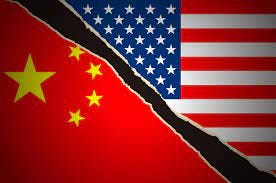
Hello and welcome to the Episode 5 of the What China Wants podcast.
The impact on the world economy from Covid and the Russian invasion of Ukraine has been heavy, creating the worst cost of living crisis in the West in years. Yet this is only an amuse bouche compared to what could happen in the near future. There is a strong chance that China, which is central to the world’s supply chains and the second largest economy, could be about to force unification with Taiwan - an event that could trigger a “Great Split” between it and the West. The results would likely be catastrophic to the world economy and the world political order.
Sam and Stewart discuss how the Great Split could happen, and what the rest of the world would think of such an event.
You can also listen to the podcast on Apple, Amazon, or Spotify.
As always please do share, comment, and subscribe. We’ll be back next week to discuss what the Great Split means for the economies of the Western Alliance.
Many thanks for listening.
***
Here is the episode transcript:
Sam Olsen: "Once the National Congress of the Communist Party of China is over in the fall of 2022, the scenario of armed unification [with Taiwan] will move toward becoming a reality. It is very likely that the leadership will move toward armed unification by 2027, the 100th anniversary of the PLA's founding."
Do you know who that was Stewart?
Stewart Paterson: I have no idea, Sam.
SO: That was Jin Canrong,a professor in Renmin University School of International Studies in China, and apparently, one of Xi Jinping's foreign policy advisors, talking about the fact that China is going to, by the sounds of it, start to plan an invasion of Taiwan within the next five years. That, of course, will lead to what we are terming, the “Great Split” between China and the West, which is the subject of this podcast, episode five of What China Wants - the first of a couple of podcasts we're going to do on the looming decoupling of China and the West.
Stewart, what's your thoughts about all this? Do you think that we're going to see a “Great Split” in our lifetime?
SP: Very much so. In fact, I'd argue that it's already started. The gradual decoupling has certainly started; maybe the total split requires a cataclysmic event like the invasion of Taiwan. What we've been seeing over the last three, four years has been a gradual drifting apart as the clash of systems has become more evident. The decoupling has been going on for several years, and is not really connected to the purported or possible invasion of Taiwan.
My sense is very much that we're witnessing a clash of political systems, a clash of economic systems. I think it's very clear in the economics case, that China is a mercantilist, statist, non-market economy, that has become the largest trading country in the world with the largest market share of exports, and that the ramifications of a non-market economy trading with the market economy have been very detrimental to economic outcomes, and that that has been the key driver of decoupling so far.
Taiwan will be the icing on the cake, that might lead to war, and will finish off any remaining linkages, but the decoupling started several years ago, and has upset the equilibrium with regards to Taiwan. That is saying that the “Great Split” is not the same as decoupling. Decoupling is the gradual process of the clash of economic systems whereas The Great Split is the final phase of that, which is caused by a catalyst, and the most likely one is the invasion of Taiwan.
SO: Well, hang on, I thought the whole point was that China was increasingly important in the world economy. When you say it's decoupling already, what is the evidence? And where is that actually happening?
SP: So the evidence is in declining interdependencies between the larger developed economies and China, so the United States and the EU, and the reorientation of China's trading patterns away from its traditional export customers, towards the developing world, its immediate neighbourhood in geographical proximity, and in particular, towards more authoritarian states.
The US is still obviously a very large trading partner for China, as is the European Union, but not relative to their overall size within the global economy. If you look at the way China is, for example, sourcing its key strategic resources, so food and energy, what you're seeing is a rising importance from either what might be described as non-aligned countries, or authoritarian regimes or pariah regimes, such as Venezuela, or Iran or Russia, for that matter.
SO: Yes, I saw that China and Iran last year or the year before, did a $400 billion deal for 25 years’ worth of oil to China, and obviously with Russia, they've become much closer since the Russian-Ukrainian war. So what you're saying is that China is re-orientating its economy away from the West, and has been for a while?
SP: Indeed, and these sort of resources in return for investment deals are increasingly common. You've got to remember that China saves more than the United States, Japan and Germany put together, and despite the fact that China has a very high investment to GDP ratio, and has done for multiple decades now, it still saves more than an invest and, therefore exports capital to the rest of the world.
China is using that capital to try and do is secure its strategic interests. One way it's doing that is through the building of infrastructure and the opening up of land routes to try and circumvent the sort of pinch-point of the Malacca Strait. But in another way, it's using that capital to procure long term contracts long term supplies of critical materials that it sees as necessary to immunise its economy from any action that the liberal democracies might take against it.
SO: So this is the Belt and Road Initiative - and what you're saying is that the Belt and Road is mainly focused on the developing world, rather than the developed world?
SP: Almost exclusively, and it's heavily focused in resource-rich areas, which China wishes to cultivate influence in, in order to secure its supplies.
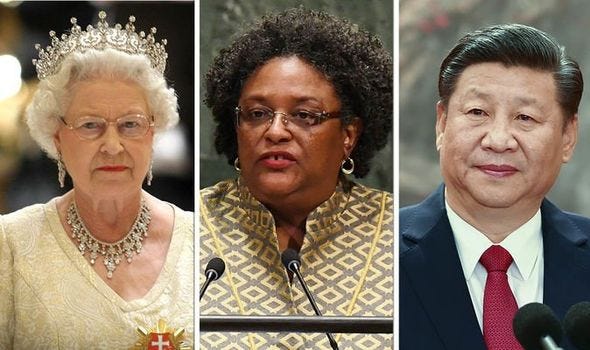
SO: So this really ties in politically to a lot of the initiatives that Beijing has been making, especially over the last few years, in the realms of politics and diplomacy. For example, the announcement recently of the Global Security Initiative, and before that their Global Development Initiative, and lots of bilateral and multilateral initiatives where they've been actively courting countries in Africa and Asia and trying to create strong diplomatic ties. They do that, for example, through the building of military infrastructure; there's lots of evidence about China building defence academies and training ranges in Africa, or in Commonwealth countries in Africa.
And it seems to me that this is very much related to something that people told me before, to the Maoist concepts around capturing the countryside to capture the cities which they used during the Chinese Civil War. What we mean by that is that from a political point of view, the Chinese have been looking to really dominate the developing world (the countryside) and thereby cutting the developing world (or the city) off from the developed world.
SP: Could you give us some examples of success, their success in this? How's that manifesting itself?
SO: That’s a good question, Stewart. Well, the most obvious answer to that is Barbados, which recently became a republic, and moved away from hundreds of years of commonality with the UK. It is still in the Commonwealth, but the fact that became a republic was seen as a move away from British influence. It's no surprise that China has been very active in supporting development within Barbados, and I think most people on the diplomatic circuit regard that decision by Barbados as a victory for China in wrenching apart British influence there.
However, it's also happened in many other countries in Asia; for example, in Thailand, the Chinese have been really looking to flip Thailand, which remember, is a treaty ally of America,
SP: And notoriously independent, right?
SO: Yes, very independent. And China's now got more influence there than America in many ways. So politically, there is a strong move to dominate the developing world. And they're putting much more effort into doing that than trying to dominate the developed world, according to our research.
SP: Okay, so Sam, you've given a good explanation there of China's rising political influence in some developing countries. Is it true to say that America's political influence in similar countries is diminishing?
SO: Yes, it is; in many ways, America is a former shadow itself.
SP: And why would you say that is?
SO: Well, from an economic point of view, as you know well, America is not the same trade partner today as it was in 1980. But from political terms, which obviously is very connected to the economics, America just doesn't seem to be putting much effort into cultivating its ties with the developing world as it did at the height of the Cold War. At that time, there was an obvious reason to do so, which was to keep communism at bay. But these days America seems to have lost its way in terms of the reason it wants to have any relationship with these countries in the first place. And into that void has slipped very easily, the looming spectre of Chinese influence pushed by Beijing.
There is an economic element, and you know far more about that than I do. But there is a political element too, when people actually sit there and say, "Well, China wants to talk to us, and America doesn't really want to talk to us." And the fact that there's still many American ambassador posts not filled under President Biden shows that diplomacy doesn't have the same level of influence within Washington than it did when, as I said, there was more purpose to keep communism at bay. Ironically, China is a communist country, and you might think that they want to keep this type of communism at bay as well, but it doesn't seem to be reflecting into their actions.
But from an economic point of view, Stewart, I mean, you must see American economic influence around the world decreasing as well?
SP: I think that's right, certainly on a relative basis. But U.S. multinationals are still very prevalent around the world and are large employers, the largest US multinationals employing about 15 million people, I think overseas.
SO: Is that more than the Chinese companies?
SP: Much more, because actually China's multinationals are few and far between in terms of manufacturing presence in third countries. You obviously have sales outlets for companies such as Huawei, and white goods companies like Haier, for example, that have modest manufacturing overseas. But China's auto industry hasn't internationalised in the same way as America's has. Its consumer brands are not really internationalised. And so, Chinese multinationals' largest overseas exposure is really through construction. And that construction obviously flows from the Belt and Road Initiative and from state bank capital being invested.
So it seems to me that China is getting far more political clout for the money that it spends overseas, and of course, there's far less of a distinction between a Chinese company and the Chinese government than there is between an American company and the American government, both literally and in the eyes of, of the would-be consumers. So clearly, China's overseas investments seem to be bringing it significantly more political influence in developing countries than America's overseas investments, which are largely designed to satisfy consumer needs of the host country, rather than necessarily to satiate the greed of the elite, or meet the country's infrastructure requirements, which are where China is focusing its attention.
If we are witnessing a sort of a clash of systems, then one would have to say that the third countries, the countries that are not closely aligned with China and not particularly closely aligned with the United States, are we concluding that China is offering a better package for these countries at the moment? And is it the case that that package is better for everyone in that country? Or it's simply the case that it's better for the ruling elite in that country?
SO: So I think, interestingly enough, we have a direct example from a few weeks ago, and Biden had that summit with ASEAN and Southeast Asia, when America announced about $102 million of funding, which is way less than what China has been putting into the region.
As we spoke about in one of the previous podcasts, that shows either a lack of interest or it could be that they just think that that's all it takes to buy Southeast Asia without realising that China's put a lot more in. So you do have this clash of expectations and clash of results as well between China and America. But the reason that I'm interested in this is because if we've got this decoupling between China and the West, the battleground is going to be those third countries, especially in the developing world.
SP: Yes, especially if we come back to your initial quote, and the invasion or potential for China to actually invade Taiwan. Now, what we seem to have learned from the Russian invasion of Ukraine is that there are a few countries in the world that care deeply about the territorial integrity of Ukraine, but there are not as many as one might have thought. And that when it comes to incurring costs, in order to preserve the territorial integrity of Ukraine, very few countries seem to be prepared to incur significant costs in order to try and make that happen.
Now, if China were to invade Taiwan, and to try and take it by force, any kind of economic sanction against China -which would be hugely expensive for the global economy - for it to work, for it to have any feasible chance of working, given the diversification of China's supplies, the support of what we might loosely call non-aligned countries, will be absolutely crucial.
SO: Yes, exactly, and the way to view is it by looking on a map and seeing which countries supported sanctions on Russia, and it’s quite simple. It's Europe, it's North America. It's Japan, South Korea, Singapore, Australia, New Zealand and one or two others. But for the vast majority of the rest of the world, they either abstained or actively sided with Russia when it came to sanctions.
That is a pattern that I'm pretty convinced we will see from a political point of view, as and when China does something which incurs the wrath of the West, and they put sanctions on China. This is because the vast majority of the world is either non-aligned or is allied with China, either allied because they love the West, or allied with China because they've become a client state, or an effective client state with China because China has so much economic or other influence on them.
SP: It's probably worth pointing out though here, Sam, that actually if you took the United States, the EU, plus the UK, and then close liberal, democratic allies of those…
SO: The same countries that have put sanctions on Russia?
SP: Yes, but together with Japan and South Korea, that actually accounts for about 60% of world GDP. What hasn't happened in the Ukraine-Russia conflict has been a situation whereby if you don't apply sanctions to Russia, you will be sanctioned yourself, we haven't had those secondary sanctions.
If in the case of a Chinese invasion of Taiwan, you were forced to take sides, because you could only trade with one side, then I would say a lot of the non-aligned countries would end up aligning with the West simply because, at the end of the day, China and its close allies account for about 20% of GDP, while the United States and its relatively close allies would account to between 50 and 60% of GDP - and the large number of countries that make up the gap between the two, would much rather probably be rolled up with the majority rather than just with China. Is that not fair?

SO: Yes, well you know more about the economic side than I do. But from a political point of view, though, I think there will be enormous pressure because China has made great strides in what we call capturing the elites of many countries and saying that "we'll look after you, as an individual and you and your families", to be blunt, through corrupt methods, but also, by offering things that the country needs or wants, i.e. an investment from the Belt and Road, which is not corrupt, but they're getting investment from China, whereas they're not getting the same investment from the West.
So either through corrupt or non-corrupt ways, the elites have been captured in many countries, and that means that if there was going to be a big decoupling or a “Great Split”, there would be a lot of pressure in those countries to side with China, whether or not it was actually in the economic best interests of the country to do so if, for example, it affected whether they were allowed to use the dollar still.
So it's very difficult to be able to predict what would happen, but I suppose Stewart one of the things we haven't done actually is talking about how this Great Split might happen. So, just to back up a little, what you're saying is that there is already a decoupling between China and the West, and we've spoken a lot about the way that the developing world has been looking at that. But, if there is this decoupling between China and the West, what we're saying, I suppose, is that this will be really accentuated by something that happens with Taiwan. I can talk a lot about the politics and the military side, but do you want to talk about the economic side of how a “Great Split” would happen?
SP: Well, I mean, I think if China were to invade Taiwan, there would have to be economic sanctions put on China, by the US.
SO: Why would we have to do that? I keep being asked that by people.
SP: Well, not to do so would be to just accept the fact that a population of 20 million or so democrats with a per capita standard of living four to five times higher than that in China could just be taken over with complete impunity.
I would say that the economic response will be more robust than that against Russia for its invasion in Ukraine. Maybe I'm misjudging that, but I think that the costs for us would certainly be higher, but I don't think anyone would wish to ally themselves with the United States again if the United States didn't do anything if China took over Taiwan.
SO: Yes, I agree. We can come back to that maybe, but just on the economic side, what would happen sanction wise?
SP: Well China has a foreign anti-sanctions law, which was put in place in the last year or so, which basically makes it illegal for an entity in China to enforce foreign sanctions on China, so you couldn't comply. For example, Nike China could not comply with US sanctions on China without being in breach of Chinese law, and that would mean it would be impossible for any multinational in China to do business in China and comply with both American law and Chinese law. And so the “Great Split” at that point would be total.
That is why I think that multinationals are now thinking twice about China and trying to reorientate their supply chains and look for ways to restructure their businesses in China, either by selling them, or completely splitting them away into separate legal entities, so that there isn't this crossover effect, and that's what the more forward-looking ones are looking to do.
But the other point I would make about China, and the potential for an invasion of Taiwan, is that given how our conversation has evolved today about China's growing influence in the rest of the world, and the likelihood that a large part of the non-aligned countries would find it very hard to choose sides, even looking at it dispassionately as to what is in their self-interest would find it hard to choose sides because of China's growing economic power.
That begs the question, if the Chinese narrative about the growth in their economy is correct, then what's the rush to invade Taiwan? Because surely giving it another 10, 15, or20 years, if China's growth trajectory is as they would forecast it to be, then this question, this ambiguity disappears, because China's economic hegemony will be total for a large part of the world. What I think is bringing the timetable forward and is creating this period of maximum danger for Taiwan, is the fact that China's economic narrative is falling apart, because the economy's growth model is broken. And if they leave it too long, what they will find is potentially that their economic influence in third countries actually starts to diminish.
SO: So Stewart, is the conclusion we've got after this session that the Great Split is likely coming, and the catalyst is likely to be Taiwan, but that there is already a big decoupling going on economically and politically between China and the West, with the developing world very much the battleground for which countries are going to support which side.
If that's the case, my question to you is from an economic point of view, what is the West and what is China doing to prepare for the “Great Split” happening?
SP: And I think, Sam, that that's where we should pick up next week.
SO: Okay, great. Well, until next week, and let's hope that nothing happens with Taiwan between now and then.
SP: Thanks, Sam.






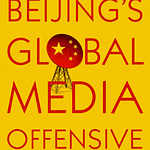
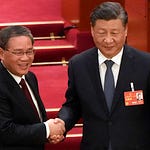
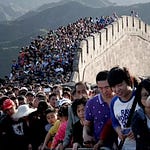



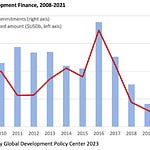
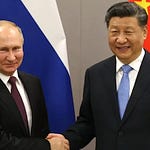
Episode 5: The Great Split between China and the West is Coming